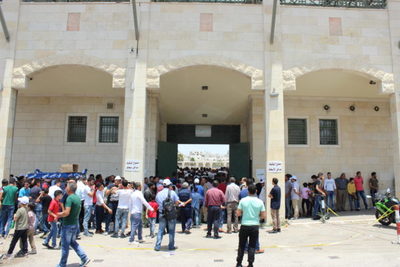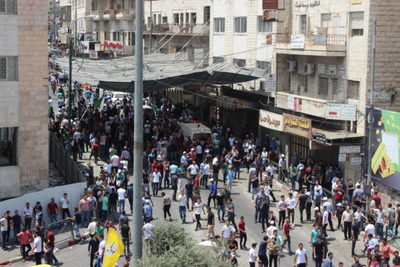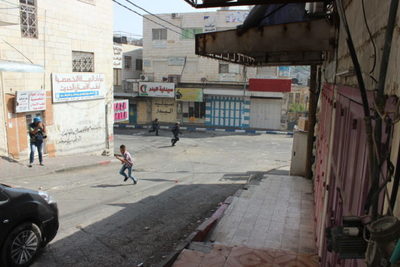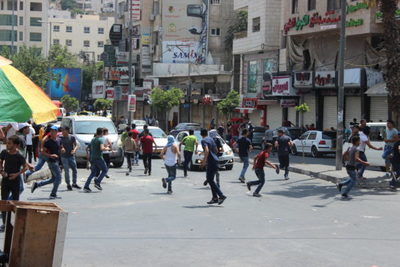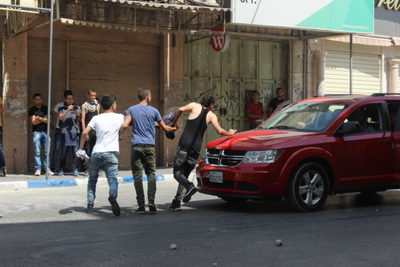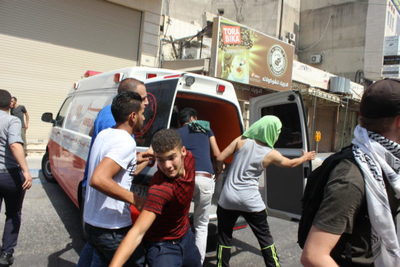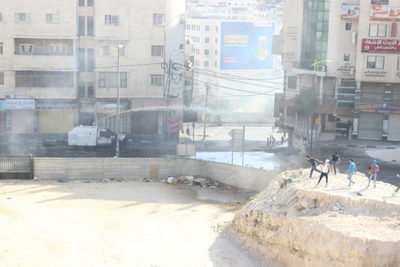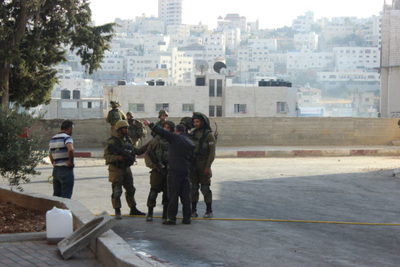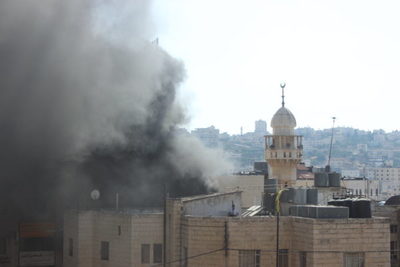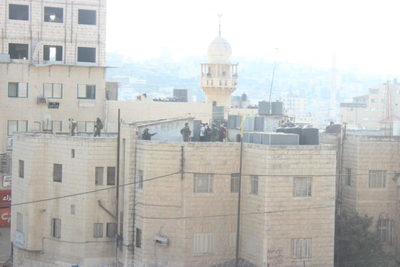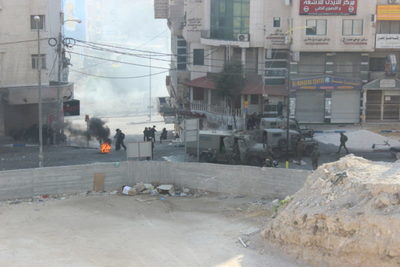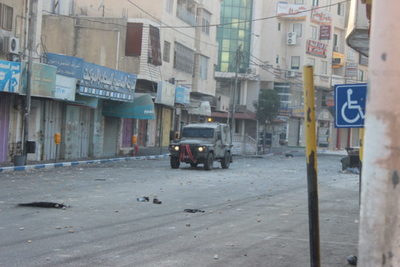25 july 2017
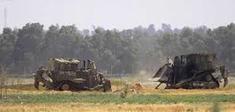
Local sources reported that Israeli tanks fired shells Tuesday morning toward Palestinian farmland and grazing pastures for animals east of Qarara, in Khan Younis, in the southern Gaza Strip.
The shells reportedly were fired from the Kosovim military base located southeast of Khan Younis. Israeli forces also entered the area with armored vehicles, according to local sources, and fired a number of rounds.
Palestinians in Gaza are living through record summer heat with only 3 hours of electricity a day or less, and 8 hours of water every three days.
Numerous Palestinians in Gaza have suffered heat exhaustion, and the sewage plant has been unable to filter waste for the last two months.
According to a recent report in Al Jazeera, “Gaza is in the third month of an externally enforced reduction of its already meagre electrical power supply.
The enclave of two million people would ordinarily require about 450 megawatts (MW) of electricity daily for around-the-clock power. However, over much of the past decade, as part of the tight Israeli blockade of Gaza, its power supplies have fluctuated around 200MW, resulting in persistent blackouts.
But over the past several months, according to the Israeli human rights organization Gisha, Gaza’s supply each day has varied from 140MW to an all-time low of 70MW, lengthening the blackouts and the human suffering.”
The shells reportedly were fired from the Kosovim military base located southeast of Khan Younis. Israeli forces also entered the area with armored vehicles, according to local sources, and fired a number of rounds.
Palestinians in Gaza are living through record summer heat with only 3 hours of electricity a day or less, and 8 hours of water every three days.
Numerous Palestinians in Gaza have suffered heat exhaustion, and the sewage plant has been unable to filter waste for the last two months.
According to a recent report in Al Jazeera, “Gaza is in the third month of an externally enforced reduction of its already meagre electrical power supply.
The enclave of two million people would ordinarily require about 450 megawatts (MW) of electricity daily for around-the-clock power. However, over much of the past decade, as part of the tight Israeli blockade of Gaza, its power supplies have fluctuated around 200MW, resulting in persistent blackouts.
But over the past several months, according to the Israeli human rights organization Gisha, Gaza’s supply each day has varied from 140MW to an all-time low of 70MW, lengthening the blackouts and the human suffering.”
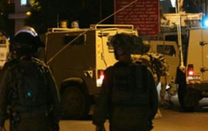
Israeli soldiers invaded, earlier Tuesday, the northern West Bank city of Nablus, shot and inured two Palestinians during ensuing clashes, and abducted two others. The army also abducted one Palestinian In Jenin.
Media sources in Nablus said the soldiers invaded many neighborhoods, and clashed with local youngsters, especially in the Eastern Market area, before shooting Ahmad Abu Mosallam, 20, with a live round in the shoulder, and Fadi Ibrahim ash-Shami, with a rubber-coated steel bullet.
Medics provided the urgently needed treatment to the two Palestinians, before moving them to Rafidia governmental hospital.
The soldiers also invaded and ransacked many homes in the governorate, and abducted Rajaey al-Qonna, from al-Ein refugee camp, and Qoteiba ‘Aseeda, from Tal village.
In Jenin, also in northern West Bank, the soldiers abducted Mohammad Yousef Manasra, 21, from his home, after invading and searching it.
Media sources in Nablus said the soldiers invaded many neighborhoods, and clashed with local youngsters, especially in the Eastern Market area, before shooting Ahmad Abu Mosallam, 20, with a live round in the shoulder, and Fadi Ibrahim ash-Shami, with a rubber-coated steel bullet.
Medics provided the urgently needed treatment to the two Palestinians, before moving them to Rafidia governmental hospital.
The soldiers also invaded and ransacked many homes in the governorate, and abducted Rajaey al-Qonna, from al-Ein refugee camp, and Qoteiba ‘Aseeda, from Tal village.
In Jenin, also in northern West Bank, the soldiers abducted Mohammad Yousef Manasra, 21, from his home, after invading and searching it.
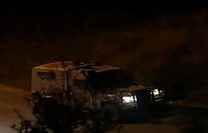
Israeli soldiers invaded, on Tuesday at dawn, Kobar village, northwest of Ramallah, and abducted three Palestinians, including the mother of a Palestinian who killed three Israeli settlers in their home, this past Friday. The army also abducted senior nonviolent activist in Bil’in.
Naim Sabah, deputy mayor of Kobar village council, said a large military force invaded the village before the soldiers stormed and ransacked dozens of homes.
He added that the soldiers abducted Ibtisam al-‘Abed, the mother of Omar, who killed Yosef Salomon, 70, his daughter Chaya, 46, and his son Elad, 36, in their home in Halamish nearby Israeli colony, on Friday.
Also in Kobar, the soldiers abducted Emad Abdul-Mon’em Sabah and Soheib Saher al-Barghouthi, from their homes, after assaulting them and their families, and caused damage to their furniture and belongings.
In addition, local medics rushed a young man, identified as Abbas Barghouthi, to a hospital after the soldiers assaulted him, causing various cuts and bruises, and confiscated a car belonging to one of his relatives.
Sabah also said that the soldiers bulldozed the village’s main road, which connects it with Abu Shkheidem nearby village.
On Tuesday morning, the soldiers abducted, Abdullah Abu Rahma, a senior nonviolent activist, the coordinator of the Popular Committee against the Wall and Colonies in Bil’in village, west of Ramallah.
Abdullah was taken prisoner at a sudden roadblock installed by the soldiers at the main entrance of Bil’in, while he was on his way to his work, before the soldiers took him to an unknown destination.
Naim Sabah, deputy mayor of Kobar village council, said a large military force invaded the village before the soldiers stormed and ransacked dozens of homes.
He added that the soldiers abducted Ibtisam al-‘Abed, the mother of Omar, who killed Yosef Salomon, 70, his daughter Chaya, 46, and his son Elad, 36, in their home in Halamish nearby Israeli colony, on Friday.
Also in Kobar, the soldiers abducted Emad Abdul-Mon’em Sabah and Soheib Saher al-Barghouthi, from their homes, after assaulting them and their families, and caused damage to their furniture and belongings.
In addition, local medics rushed a young man, identified as Abbas Barghouthi, to a hospital after the soldiers assaulted him, causing various cuts and bruises, and confiscated a car belonging to one of his relatives.
Sabah also said that the soldiers bulldozed the village’s main road, which connects it with Abu Shkheidem nearby village.
On Tuesday morning, the soldiers abducted, Abdullah Abu Rahma, a senior nonviolent activist, the coordinator of the Popular Committee against the Wall and Colonies in Bil’in village, west of Ramallah.
Abdullah was taken prisoner at a sudden roadblock installed by the soldiers at the main entrance of Bil’in, while he was on his way to his work, before the soldiers took him to an unknown destination.
24 july 2017
|
|
Thousands of Palestinians took to the streets of al-Khalil (Hebron), this Friday, to protest Israel’s tightening of access restrictions to Jerusalem’s al-Aqsa mosque. The protest was suppressed violently by scores of Israeli soldiers and police, who fired live ammunition indiscriminately into crowds of young men and boys.
At least 10 Palestinians were wounded with live ammunition, including one young man shot in the stomach, and another near the heart. Many more were wounded by rubber-coated steel bullets and tear gas, with hospitals and ambulances struggling to hope. The situation was made worse by Israeli forces storming the nearby hospital once, and twice occupying its entrances. |
The demonstration followed the closure of Hebron’s mosques in solidarity with those unable to worship at al-Aqsa. Instead, worshipers prayed at Hussein Bin Ali stadium before marching down Ain Sarah street, towards Bab al-Zawiye.
Once the march reached the market, some children began throwing stones and fireworks at the gate of Checkpoint 56, which separates Palestinians from Shuhada street.
Soldiers responded by storming out of the checkpoint, firing tear gas and throwing sound grenades. Hundreds of demonstrators retreated back up Ain Sarah street as soldiers regrouped in the square with various armoured vehicles. The soldiers then pushed up towards al-Manarah roundabout, meeting a crowd of young men and boys. Soldiers responded to stones with live ammunition, immediately hitting a 20-year old man in the leg.
Meanwhile, a similar confrontation was occurring on the neighbouring Ain Sarah street, with snipers shooting a 20-year old man in the foot and a 17-year old boy in the leg.
Soldiers and police continued to fire tear gas and .22 calibre ammunition at the crowd, until a volley of stones forced them to retreat towards Bab al-Zawiye.
A second offensive, however, saw Israeli forces push back towards Alia mosque. Palestinian youths continued to throw stones at the heavily-armed soldiers and police, who then sent out a water cannon to spray the boys with chemically-treated, foul-smelling ‘skunk’ (sewage) water.
Soldiers pursued the water cannon, and chased protesters into Queen Alia hospital, surrounding it for more than half an hour.
In the mean time, around 60 soldiers and border police pushed forward and assembled with several vehicles at the intersection, while roughly 20 more occupied the roofs of nearby residential buildings.
Three teenage boys who had been watching the protest from their roof were blindfolded, handcuffed and detained by soldiers who stormed their building.
A group of young Palestinians continued throwing stones at the Israeli forces, as well as rolling flaming tires down the hill towards them. As soldiers began to push up the hill, Palestinians watching from the hospital parking lot barricaded themselves in, but without success. Doctors asked the soldiers, who were now occupying hospital grounds for a third time in one afternoon, to leave.
Eventually, the soldiers retreated back down the hill, regrouping with the border police and other soldiers. Despite Palestinian teenagers continuing to throw stones and tires down the hill, Israeli forces began to head back to their bases. Local youth followed them as they made their way back to Bab al-Zawiye and Checkpoint 56.
Once the march reached the market, some children began throwing stones and fireworks at the gate of Checkpoint 56, which separates Palestinians from Shuhada street.
Soldiers responded by storming out of the checkpoint, firing tear gas and throwing sound grenades. Hundreds of demonstrators retreated back up Ain Sarah street as soldiers regrouped in the square with various armoured vehicles. The soldiers then pushed up towards al-Manarah roundabout, meeting a crowd of young men and boys. Soldiers responded to stones with live ammunition, immediately hitting a 20-year old man in the leg.
Meanwhile, a similar confrontation was occurring on the neighbouring Ain Sarah street, with snipers shooting a 20-year old man in the foot and a 17-year old boy in the leg.
Soldiers and police continued to fire tear gas and .22 calibre ammunition at the crowd, until a volley of stones forced them to retreat towards Bab al-Zawiye.
A second offensive, however, saw Israeli forces push back towards Alia mosque. Palestinian youths continued to throw stones at the heavily-armed soldiers and police, who then sent out a water cannon to spray the boys with chemically-treated, foul-smelling ‘skunk’ (sewage) water.
Soldiers pursued the water cannon, and chased protesters into Queen Alia hospital, surrounding it for more than half an hour.
In the mean time, around 60 soldiers and border police pushed forward and assembled with several vehicles at the intersection, while roughly 20 more occupied the roofs of nearby residential buildings.
Three teenage boys who had been watching the protest from their roof were blindfolded, handcuffed and detained by soldiers who stormed their building.
A group of young Palestinians continued throwing stones at the Israeli forces, as well as rolling flaming tires down the hill towards them. As soldiers began to push up the hill, Palestinians watching from the hospital parking lot barricaded themselves in, but without success. Doctors asked the soldiers, who were now occupying hospital grounds for a third time in one afternoon, to leave.
Eventually, the soldiers retreated back down the hill, regrouping with the border police and other soldiers. Despite Palestinian teenagers continuing to throw stones and tires down the hill, Israeli forces began to head back to their bases. Local youth followed them as they made their way back to Bab al-Zawiye and Checkpoint 56.
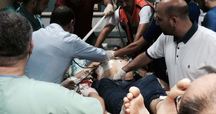
Israeli soldiers shot and seriously injured, on Monday evening, a young Palestinian man with a live round to the head, during clashes that took place after the army invaded Hizma town, northeast of occupied East Jerusalem.
The Palestinian Health Ministry said the young man, 26 years of age, was moved to the Palestine Medical Complex in Ramallah, and was instantly moved to the surgery ward.
The young man is currently at the Intensive Care Unit, and is still in a life-threatening condition.
In addition, the soldiers abducted Mohammad Nidal Mansour, 21, from al-Far’a refugee camp, south of Tubas, in the northeastern West Bank, after stopping him at a sudden military roadblock, near al-Bathan Valley, northeast of Nablus, in northern West Bank.
Palestinian youth critically injured in Israeli police shooting in OJ
A Palestinian young man was seriously wounded in Israeli police random shooting at demonstrators in Hizma town to the east of Occupied Jerusalem on Monday evening.
The Palestinian health ministry said that a 26-year-old youth was hit with a rubber bullet in his head and has undergone a surgery, describing his condition as very serious.
Clashes erupted between Israeli occupation police and Palestinians on Monday evening in Alezariye, Issawiye, and the Qalandiya checkpoint.
Tension has been running high in Occupied Jerusalem since July 16 when Israeli occupation authorities installed metal gates at the entrances of the holy Aqsa Mosque, a measure that was refused by the Jerusalemites.
The Palestinian Health Ministry said the young man, 26 years of age, was moved to the Palestine Medical Complex in Ramallah, and was instantly moved to the surgery ward.
The young man is currently at the Intensive Care Unit, and is still in a life-threatening condition.
In addition, the soldiers abducted Mohammad Nidal Mansour, 21, from al-Far’a refugee camp, south of Tubas, in the northeastern West Bank, after stopping him at a sudden military roadblock, near al-Bathan Valley, northeast of Nablus, in northern West Bank.
Palestinian youth critically injured in Israeli police shooting in OJ
A Palestinian young man was seriously wounded in Israeli police random shooting at demonstrators in Hizma town to the east of Occupied Jerusalem on Monday evening.
The Palestinian health ministry said that a 26-year-old youth was hit with a rubber bullet in his head and has undergone a surgery, describing his condition as very serious.
Clashes erupted between Israeli occupation police and Palestinians on Monday evening in Alezariye, Issawiye, and the Qalandiya checkpoint.
Tension has been running high in Occupied Jerusalem since July 16 when Israeli occupation authorities installed metal gates at the entrances of the holy Aqsa Mosque, a measure that was refused by the Jerusalemites.
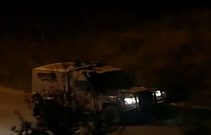
Several Israeli army jeeps invaded, on Monday at night, the town of Sa’ir, north of the southern West Bank city of Hebron, and clashed with many local youngsters, who hurled stones and empty bottles at the military vehicles.
Media sources in Sa’ir said the soldiers fired many rubber-coated steel bullets, gas bombs and concussion grenades.
There have been no reports of injuries, abductions or home invasions, and the military withdrew from the town later.
Media sources in Sa’ir said the soldiers fired many rubber-coated steel bullets, gas bombs and concussion grenades.
There have been no reports of injuries, abductions or home invasions, and the military withdrew from the town later.
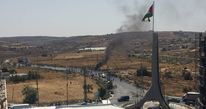
Violent clashes erupted at noon Monday between Palestinian youths and Israeli Occupation Forces (IOF) at Beit El military barrier north of Ramallah.
The PIC reporter said that hundreds of Birzeit University students participated in a march that followed an in-campus massive sit-in and headed to Beit El checkpoint. The event was held in support of al-Aqsa Mosque as well as in protest at the installation of metal detectors at its gates.
The Palestinian Red Crescent Society stated that IOF soldiers opened fire at protesters resulting in injuries among them including two with live bullets. The Palestinian Health Ministry announced, however, that four moderate injuries by Israeli live bullets were reported. The wounded were treated in the Palestine Medical Complex in Ramallah.
The PIC reporter said that hundreds of Birzeit University students participated in a march that followed an in-campus massive sit-in and headed to Beit El checkpoint. The event was held in support of al-Aqsa Mosque as well as in protest at the installation of metal detectors at its gates.
The Palestinian Red Crescent Society stated that IOF soldiers opened fire at protesters resulting in injuries among them including two with live bullets. The Palestinian Health Ministry announced, however, that four moderate injuries by Israeli live bullets were reported. The wounded were treated in the Palestine Medical Complex in Ramallah.
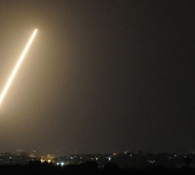
Israeli soldiers fired several, on Monday at dawn, artillery shells into a few areas, east of Deir al-Balah, in central Gaza, causing damage.
Palestinian sources in Gaza said the soldiers fired shells into monitoring sites used by fighters of the Al-Qassam Brigades, the armed wing of Hamas.
Meanwhile, the Israeli army said a shell, allegedly fired from the Gaza Strip, landed and exploded in an open area in the Sha’ar HaNegev Regional Council of Settlements, causing no injuries or damage.
Israeli Ynet News said the warning systems were not activated when the shell was reportedly fired from Gaza, and that the army initiated an investigation into the issue,
Palestinian sources in Gaza said the soldiers fired shells into monitoring sites used by fighters of the Al-Qassam Brigades, the armed wing of Hamas.
Meanwhile, the Israeli army said a shell, allegedly fired from the Gaza Strip, landed and exploded in an open area in the Sha’ar HaNegev Regional Council of Settlements, causing no injuries or damage.
Israeli Ynet News said the warning systems were not activated when the shell was reportedly fired from Gaza, and that the army initiated an investigation into the issue,
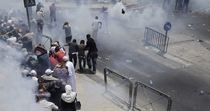
“We, in Jerusalem, feel like we are completely on our own, facing ongoing Israeli violations, while some Arab government are competing with each other on who is better in normalizing with Israel, while its soldiers are invading surgery rooms, attacking staff and patients, and are attempting to abduct wounded Palestinians, and even the corpses of those who were killed by the army.”
This was a statement issued by the al-Makassed hospital, in occupied East Jerusalem, after Israeli soldiers, once again, invaded the medical center, on Friday, before attacking patients and medical staff, in addition to breaking into patient’s rooms, and even surgery wards.
The administration of al-Makassed said the latest attack was the ugliest, and most violent, since the beginning of the first Intifada in 1987.
“The soldiers resorted to the excessive use of force against the physicians, nurses, staffers and even patients, in a direct violation of all international laws and human rights agreements,” it said, “On Friday alone, and by 4:30 in the afternoon, were provided medical care to more than 100 wounded Palestinians, and fifty others on Thursday. Many of the inured suffered serious injuries to the head, chest and abdomen, and we had to perform urgent surgeries to all of them.”
“There is also a large number of wounded Palestinians, who could not make it into the hospital because of the extensive Israeli siege around the it, and the heavy military deployment in its various wards.”
The hospital administration also denounced an invasion carried out by more than fifty Israeli soldiers, who broke into the urgent care units, blood bank, and various wards in the medical center, looking for wounded Palestinians to abduct them.
The soldiers even assaulted Palestinians who came to donate blood, before kicking them and the medial staff out of the blood bank unit.
The hospital called on the international community, all legal and human rights groups, to provide the urgently needed protection against these escalating, serious Israeli violations, especially since Tel Aviv pays no respect to the sanctity of medical centers, and related human rights agreements.
“We feel we are on our own, facing an unprecedented escalation, and the usual Arab and international silence and complicity. While some Arab countries are rushing to normalize with Israel, and extending bridges of love and cooperation with Tel Aviv, it is responding to that with more violations, storming hospitals with automatic machine guns, and even invading surgery rooms.”
The hospital thanked all Palestinians who donated blood, and added that at least 220 Palestinians donated blood on Friday alone.
The latest invasions into the hospital were not the first, as the soldiers have raided it, and its branches many times before, and even fired gas bombs at it, including the maternity and surgery wards.
Articles documenting some of the previous invasions into Al-Makassed hospital
Army Fires Gas Bombs Into Al-Makassed Hospital In Jerusalem
Israeli Soldiers Invade Al-Makassed Hospital In Jerusalem, For Fifth Time In One Month
Video: Israeli Military Attacks Against Al-Makassed Hospital Continue; Gas Bombs Fired
Video: ‘Al-Makassed Hospital In Jerusalem Subject To Ongoing Israeli Invasions’
Israeli Forces Raid Jerusalem’s Al-Makassed Hospital
Soldiers Invade Al-Makassed Hospital In Jerusalem
This was a statement issued by the al-Makassed hospital, in occupied East Jerusalem, after Israeli soldiers, once again, invaded the medical center, on Friday, before attacking patients and medical staff, in addition to breaking into patient’s rooms, and even surgery wards.
The administration of al-Makassed said the latest attack was the ugliest, and most violent, since the beginning of the first Intifada in 1987.
“The soldiers resorted to the excessive use of force against the physicians, nurses, staffers and even patients, in a direct violation of all international laws and human rights agreements,” it said, “On Friday alone, and by 4:30 in the afternoon, were provided medical care to more than 100 wounded Palestinians, and fifty others on Thursday. Many of the inured suffered serious injuries to the head, chest and abdomen, and we had to perform urgent surgeries to all of them.”
“There is also a large number of wounded Palestinians, who could not make it into the hospital because of the extensive Israeli siege around the it, and the heavy military deployment in its various wards.”
The hospital administration also denounced an invasion carried out by more than fifty Israeli soldiers, who broke into the urgent care units, blood bank, and various wards in the medical center, looking for wounded Palestinians to abduct them.
The soldiers even assaulted Palestinians who came to donate blood, before kicking them and the medial staff out of the blood bank unit.
The hospital called on the international community, all legal and human rights groups, to provide the urgently needed protection against these escalating, serious Israeli violations, especially since Tel Aviv pays no respect to the sanctity of medical centers, and related human rights agreements.
“We feel we are on our own, facing an unprecedented escalation, and the usual Arab and international silence and complicity. While some Arab countries are rushing to normalize with Israel, and extending bridges of love and cooperation with Tel Aviv, it is responding to that with more violations, storming hospitals with automatic machine guns, and even invading surgery rooms.”
The hospital thanked all Palestinians who donated blood, and added that at least 220 Palestinians donated blood on Friday alone.
The latest invasions into the hospital were not the first, as the soldiers have raided it, and its branches many times before, and even fired gas bombs at it, including the maternity and surgery wards.
Articles documenting some of the previous invasions into Al-Makassed hospital
Army Fires Gas Bombs Into Al-Makassed Hospital In Jerusalem
Israeli Soldiers Invade Al-Makassed Hospital In Jerusalem, For Fifth Time In One Month
Video: Israeli Military Attacks Against Al-Makassed Hospital Continue; Gas Bombs Fired
Video: ‘Al-Makassed Hospital In Jerusalem Subject To Ongoing Israeli Invasions’
Israeli Forces Raid Jerusalem’s Al-Makassed Hospital
Soldiers Invade Al-Makassed Hospital In Jerusalem
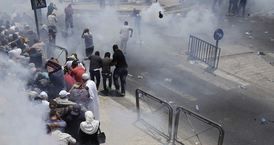
Israeli soldiers injured, on Sunday at night, many Palestinians, who suffered the severe effects of teargas inhalation, after several army jeeps invaded the al-Khader town, south of Bethlehem, and clashes with local youths.
Ahmad Salah, the coordinator of the Popular Committee against the Israeli Annexation Wall and Colonies in al-Khader, said the Palestinians were holding a nonviolent procession in the town, denouncing the Israeli assaults and escalation, in occupied Jerusalem, especially against Al-Aqsa mosque.
He added that the soldiers invaded the town, and immediately started firing rubber-coated steel bullets and gas bombs at the protesters, leading to clashes, and causing many Palestinians to suffer the severe effects of teargas inhalation.
During the clashes, some protesters hurled Molotov cocktails at the military jeeps, burning one. The army reported no injuries among the soldiers.
Ahmad Salah, the coordinator of the Popular Committee against the Israeli Annexation Wall and Colonies in al-Khader, said the Palestinians were holding a nonviolent procession in the town, denouncing the Israeli assaults and escalation, in occupied Jerusalem, especially against Al-Aqsa mosque.
He added that the soldiers invaded the town, and immediately started firing rubber-coated steel bullets and gas bombs at the protesters, leading to clashes, and causing many Palestinians to suffer the severe effects of teargas inhalation.
During the clashes, some protesters hurled Molotov cocktails at the military jeeps, burning one. The army reported no injuries among the soldiers.
